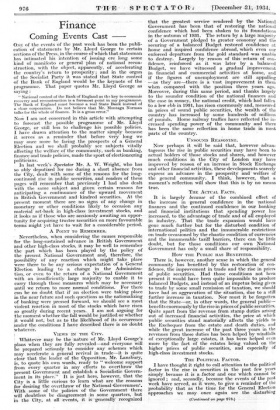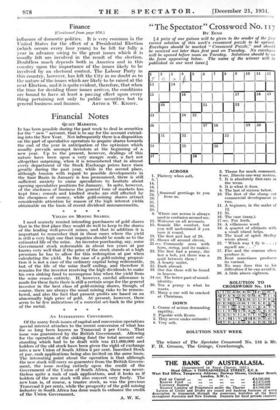Finance
Coming Events Cast ONE of the events of the past week has been the publi- cation of statements by Mr. Lloyd George to certain sections of the Press, in the course of which that statesman has intimated his intention of issuing ere long some kind of manifesto or general plan of national recon- struction, with the object, apparently, of accelerating the country's return to prosperity; and in the organ of the Socialist Party it was stated that State control of the Bank of England would be the keynote of the programme. That paper quotes Mr. Lloyd George as saying :
" National control of the Bank of England as th9 key to economic recovery and reconstruction is a foremost -point in my programme. The Bank of England must become a real State Bank instead of a close corporation. Do not believe that Mr. Montagu Norman talks for the whole of finance. It is a gross error."
Now I am not concerned in this article with attempting to forecast the possible programme of Mr. Lloyd George, or still less to challenge his possible policies. I have drawn attention to the matter simply because it serves as a reminder that before very long we may once more be facing .the prospects of a General Election and we shall probably see subjects vitally affecting the welfare of the community, such as banking, finance and trade policies, made the sport of electioneering politicians. In last week's Spectator Mr. A. W. Wright, who has so ably deputized for me during a short absence from the City, dealt with some of the reasons for the long- continued rise in public securities, and readers of these pages will remember that previously I had also dealt with the same subject and given certain reasons for anticipating a continuance of the' upward movement in British Government and- kindred securities. At the present moment there are no signs of any change in monetary or other conditions likely to occasion any material set-back in high-class investment stocks, and it looks as if those who are anxiously awaiting an oppor- tunity for acquiring trustee securities on more favourable terms might yet have to wait for a considerable period.
A POINT TO REMEMBER.
Nevertheless, when considering the causes responsible for the long-sustained advance in British Government and other high-class stocks, it may be well to remember the part which has been played by the policy of the present National Government and, therefore, the possibility of any reaction which might take place were there to be any serious expectation of a General Election leading to a change in the Administra- tion, or even to the return of a National Government with an insufficiently large majority to enable it to carry through those measures which may be necessary until we return to more normal conditions. For there can be no doubt that if an election were taking place in the near future and such questions as the nationalizing of banking were pressed forward, we should see a most violent reaction in most of the stocks which have risen so greatly during recent years. I am not arguing for the moment whether the fall would be justified or whether it would not; but as to the likelihood of its occurrence ;under' the conditions I haVe described there is no doubt whatever.
VIEWS IN THE CITY.
'Whiltever may be the :nature of Mr. Lloyd George's plans when they are fully revealed—and everyone will be prepared seriously to consider any schemes which may accelerate a general revival in trade—it is quite clear that the leader of the Opposition, Mr. Lansbury, is, to quote his own words, ready to " welcome support from every quarter in any efforts to overthrow the present Government and establish a Socialistic• Govern- ment in its place." It is just here, however, that the City is a little curious -to learn what are the -reasons for desiring the overthrow 'of the National•Governmen`. With some of the policies of the Government "there will doubtless be disagreement • in some quarters, but in the City, at all events, it is generally recognized that the greatest service rendered' by the National Government has been that of restoring the national confidence which had been shaken to its foundations in the autumn- of 1931. The return by a large majority of a Government pledged to greater economy and the securing of a balanced Budget restored confidence at home and inspired confidence abroad, which even our enforced departure from the gold standard was unable to destroy. Largely by 'reason of this return of con- fidence, reinforced as it was later by a balanced Budget, , we have witnessed a gradual improvement in financial and 'commercial activities at home, and if the figures of unemployment are still appalling —as they are—there is a vast improvement in them when compared with the position three years- ago. Moreover, during this same period, and thanks largely to the sounder condition of the national finances and the ease in money, the national credit, which had fallen to a low ebb in 1981, has risen enormously and, measured in prices of sound public securities, the wealth of the country has increased by • some hundreds- of millions of pounds. Home railway traffics have reflected the in- creased spending power of the community and there has been the same reflection in home trade in most parts of the country.
- UNSOUND REASONING.
Now perhaps it -will be said that, however advan- tageous the rise in public securities may have been to actual holders of those stocks and shares, and however much conditions in the City of London may have improved by reason of an increase in Stock Exchange and other financial activities, these developments scarcely express an advance in the prosperity and welfare of the general community: I think, however, that a moment's reflection will show that this is by no means true.
THE ACTUAL FACTS.
It is largely because of the combined effect of the increase in -general confidence in the -national finances and the continued confidence in our banking and financial institutions that spending power , has increased, to the advantage of trade and of all employed in industry. That the trade expansion would have gone much further but for the disturbed condition of international politics and the innumerable restrictions on trade occasioned by the chaotic condition of currencies and the innumerable tariff barriers, there can be little doubt, but for those conditions our own National Government has only a small share of responsibility.
How THE PUBLIC HAS BENEFITED.
There is, however, another sense in which the general community has benefited by this restoration of con- fidence, the improvement in trade and the rise in prices of public' securities.. Had those conditions not been present it would have been quite impossible to produce balanced Budgets, and instead of an impetus being given to trade by some small remission of taxation, we should have had an aggravation of the situation, due to a still further increase in taxation. Nor must it be forgotten that the State—or, in other words, the general public— benefits enormously by the rise in prices of public securities. Quite apart from the revenue from stamp duties arising out of increased financial activities, the price at which public securities stand materially affects the yields to the Exchequer from the- estate and death duties, and while the great increase of the past three years in the revenues from these duties has been helped by windfalls of exceptionally large estates, it has been helped even more by the fact of the estates being valued on the higher prices of public securities, and especially of high-class investment stocks.
THE POLITICAL FACTOR.
I have thought it right to call attention to the political factor in the rise in securities in the past few years simply because it .is a -factor and one which cannot be ignored ; and, secondly, because the events of the past week have served, as it were, to give a reminder of the probability that as the time for the General Election approaches we may once again see the disturbing
(Continued on page 978.)
Finance
(Continued from page 976.)
influence of domestic politics. It is very common in the United States for the effect of a Presidential Election (which occurs every four years) to be felt for fully a year in advance owing to the great issues which it is usually felt are involved in the result of the election. Doubtless much depends both in America and in this country upon the importance of the issues likely to be involved by an electoral contest. The Labour Party in this country, however, has left the City in no doubt as to the nature of the issues which are likely to be raised at the next Election, and it is quite evident, therefore, that when the time for deciding those issues arrives, the conditions are bound to have at least a passing effect upon every thing pertaining not only to public securities but to general business and finance. ARTHUR W. KIDDY.



































 Previous page
Previous page